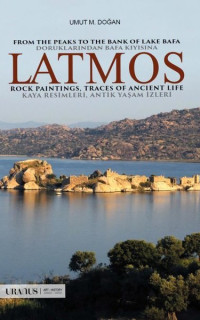
Doruklarından Bafa Kıyısına: Latmos - Kaya Resimleri - Antik Yaşam İzleri
| ISBN | 9786055940508 |
| Yayınevi | URANUS |
| Yazarlar | Yayınevi: URANUS (author) |
| Kitap Tanıtımı | Doruklarından Bafa KıyısınaLatmosKaya Resimleri, Antİk Yaşam İzleri Beşparmak (Latmos) Dağları, tarihin erken evrelerinden itibaren kutsal yer kabul edilmiştir. Kuzeydeki Büyük Menderes Vadisi’nin önünde devasa bir doğal anıt gibi yükselen gnays kayalıklarının oluşturduğu Beşparmak Dağları geçit vermez bir kale gibidir. Dağın bu aşılmaz görünümü tarihin eski zamanlarından günümüze ona atfedilen kutsallığın en önemli kaynağı olmalıdır. Prehistorik devirlerde bu dağların, yağmur ve havanın bereketini koruyan bir güçe, tanrıya ev sahipliği yaptığına inanılıyordu. Dağın doruklarını oluşturan zirve, bu yüce yaratıcı gücün tahtıydı. Tanrının bu görkemli tepeden gönderdiği esintilerve yağmurlar ovalara bereket sağlıyordu. Neolitik Çağ’ın sonlarından itibaren coğrafyaya bu kutsal imgeyi yakıştıran insanoğlunun torunları için de Beşparmak Dağları bin yıllar boyunca kutsal kalmayı sürdürdü. Hitit Çağı’nda bu dağın eteklerine çizilen Luwi hiyeroglif yazıtlı betimler bu geleneğin izleri olsa gerek. Antik Çağ insanının, dağın zirvesine bu sefer de bir başka tanrının, Zeus’un tahtını kondurmuş olması tesadüf değildir. Orta Çağ’da Hıristiyan inancının birçok dinsel mekânına ev sahipliği yapan Beşparmak Dağları’nda, MS.10. yüzyıla kadar izi sürülen yağmur duası ritüelleri on bin yıllık bir kültürel gen aktarımından başka ne olabilir ki? Antik Çağ yazılı kaynaklarında bu dağların ismi Latmos’tu. Bu çağda dağın eteklerine kurulan kente de aynı isim verildi. Latmos’un devamı ise Latmos kenarındaki Herakleia anlamına gelen Herakleia Latmos’tu. Herakleia Latmos kentinin yaslandığı Beşparmak Dağları’nın yüksek kesimlerinde tespit edilen kaya resimleri MÖ. 6. bin yılın yarı göçebe kültüründen bugüne kalan izlerdir. Bu resimler sayesinde Latmos Herakleiası’nın bulunduğu coğrafyada kültür tarihinin başlangıcı Geç Neolitik Çağ’a kadar indirilmiştir. Son yapılan araştırmalarda bu ilginç veriler Latmos Herakleiası kadar Batı Anadolu tarihinde de yepyeni ufuklar açmıştır. Doruklarından Bafa Gölü kıyısına, Geç Neolitik Çağ’dan günümüze uzanan yaşam izleri, gizemli Latmos’un dünyada tek olma ayrıcalığıdır; bu izlerde yola çıkmak, keyifli, unutulmaz, sorumluluk yükleyen eşsiz bir deneyimdir. Ege Denizi’nin küçük körfezini (günümüzde Bafa Gölü) gören ayrıcalıklı zor coğrafyasında, bir anıt gibi göğe yükselen Latmos’da insan üstü çabayla yaşam kuran halklar, dünyanın en ayrıcalıklı mirasını armağan etmişlerdir. Bu dünya mirasını sahiplenip, koruyarak gelecek kuşaklara aktarmak günümüz coğrafyasında yaşayanların elindedir. From The Peaks To The Bank Of Lake BafaLatmosRock Paintings, Traces Of Ancient Life Regarded as a sacred area since the earliest stages of history, the Beşparmak Mountains (Mount Latmos) resemble an impassable fortress that is composed of gneiss rock formations rising like a natural monument before the Büyük Menderes Valley. This impassable appearance of the mountain must be the most important source of the sacredness that is attributed to it since prehistoric times. During prehistoric times, these mountains were believed to host a god, a power who preserved the plenty of rain and weather. The peak of the mountain was the throne of this supreme creative power. The breeze and rain, sent by the god from this magnificent peak, brought abundance to the plains. Beşparmak Mountains remained sacred for thousands of years, even for the descendants of the people who associated this region with this sacred image since the end of the Neolithic Period. The Luwian hieroglyphs inscribed at the foothills of this mountain during the Hittite Period must have been the traces of this tradition. Neither, it is a coincidence that ancient people placed the throne of another god, Zeus, at the peak of this mountain. The rain prayers, which can be traced back as far as the 10th century AD, must undoubtedly be a 10.000-year cultural transfer in the Beşparmak Mountains, which has hosted numerous religious spaces of the Christian belief in the Medieval Period. The name of the Beşparmak Mountains is referred to as Latmosin ancient written sources. The same name was given to the city that wasestablished at the foothills of this mountain in this period. The name of the ancient city “Herakleia ad Latmos” bore the meaning “Herakleia under Latmos”. The rock paintings discovered on the highest areas of the Beşparmak Mountains, against which the ancient city of Herakleia ad Latmos reclined, are the traces of the semi-nomadic culture of the 6th millennium BC, that have survived to this day. It is through these paintings that the beginning of cultural history in this region wherethe ancient city of Heakleia ad Latmos is situated, could be extended to as early as the Late Neolithic Period. The interesting data attained in recent research, has broadened new horizons in the history of Western Anatolia as well as Herakleia ad Latmos. Traces of life in Latmos from the peaks to the bank of Lake Bafa, from the late Neolithic to the present, are a privilege that makes the mysterious Latmos unique in the world. Traveling in the midst of these traces is a delighting, unforgettable and unique but it also brings responsibility. People who established their lives with superhuman efforts in this difficult and privileged geography overlooking the small gulf (today Lake Bafa) of the Aegean Sea, in Latmos rising towards to sky like a monument, had offered the most privileged heritage in the world. It is the duty of those who live in this geography today, to embrace and protect this world heritage and to transfer it to future generations. (Tanıtım Bülteninden) ) |
Kütüphaneniz